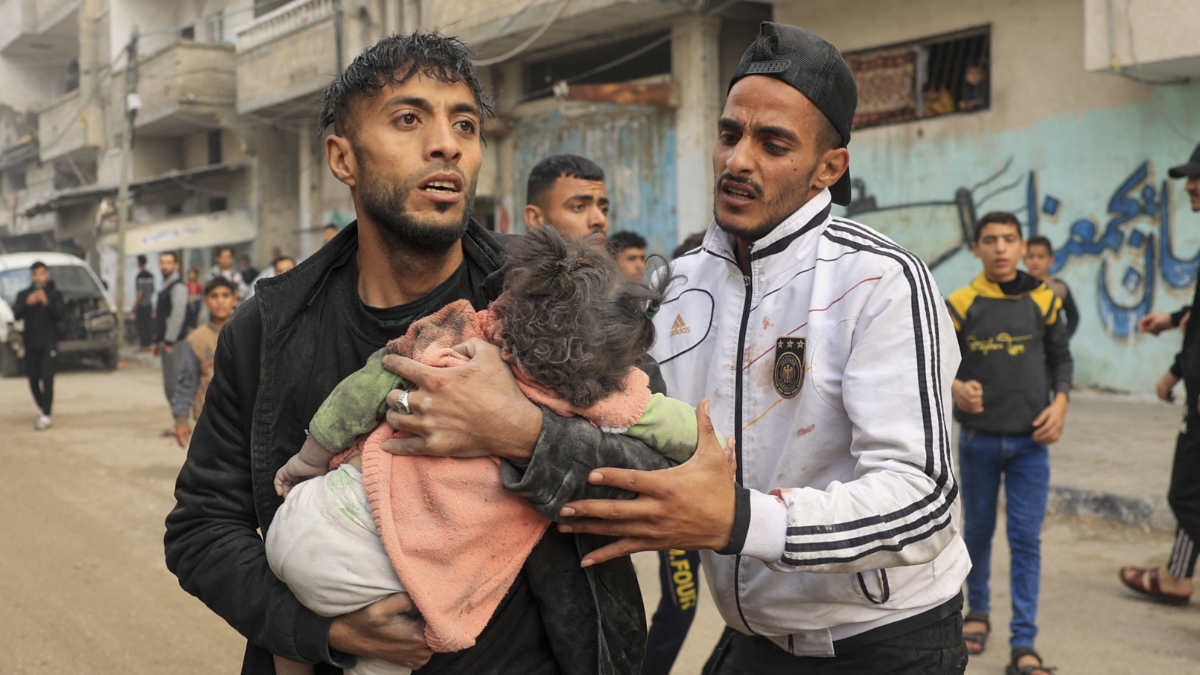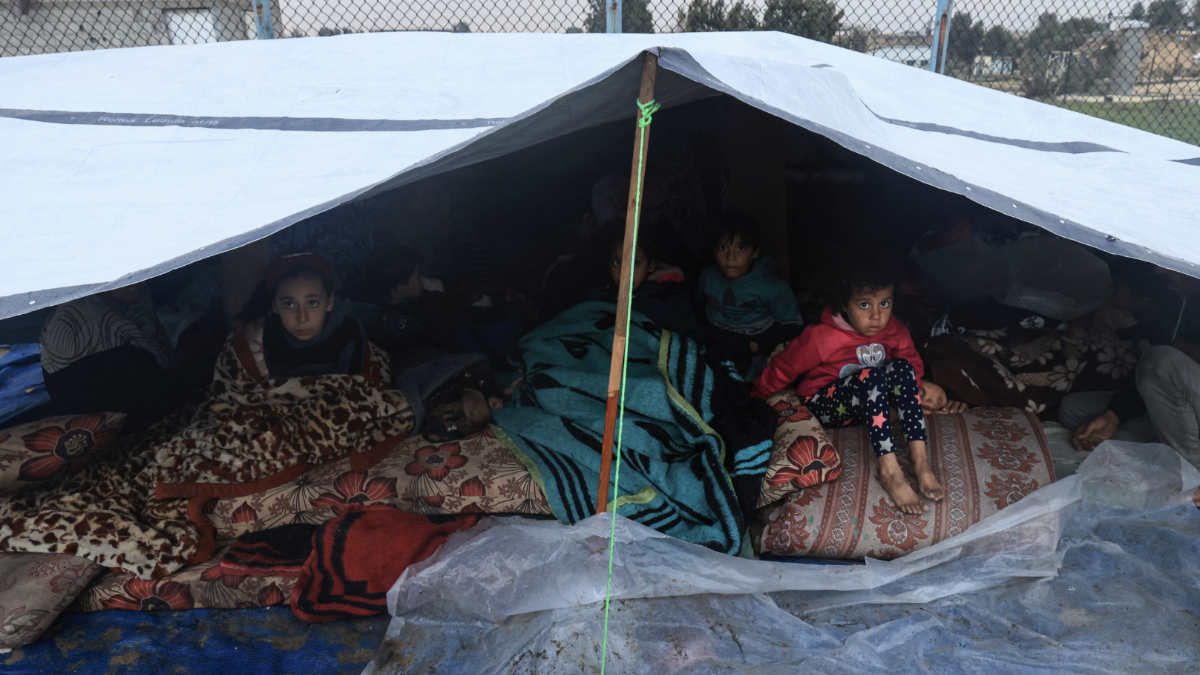Israel-Palestine war: 'Hellfire' and chaos in Rafah tests Biden's opposition to displacement
Biden administration pushes for 'low intensity' conflict as displacement out of desperation becomes a greater reality for Palestinians

Biden’s public pledge to oppose the forced displacement of Palestinians from the besieged enclave is looking increasingly tenuous amid a humanitarian crisis brewing in Rafah, Gaza’s southernmost city.
Stark warnings that social order is breaking down in southern Gaza, with the potential to send hundreds of thousands of desperate Palestinians across the border to Egypt, is testing one of US President Joe Biden’s clearest red lines on Israel's offensive, current and former US officials told Middle East Eye.
“We seem to be on the glide path to displacement by desperation,” William Usher, a former senior Middle East analyst at the CIA, told MEE. “That would be an embarrassment for the Biden administration, which is clearly growing more frustrated with Israel.”
Roughly 90 percent of Gaza’s population - 1.9 million Palestinians - are internally displaced as a result of Israel’s offensive, with about one million of those now boxed into tiny Rafah, where they are living in squalid conditions under Israeli bombardment.
Palestinians in Rafah have been forced to sleep on the street and in makeshift tents. The UN has documented the outbreak of chicken pox, meningitis, jaundice, and respiratory infections because of severe overcrowding, and says Palestinians are now defecating outside due to a lack of latrines. Poor sanitation is causing diarrhea.
On Wednesday, Unrwa commissioner general Philippe Lazzarini warned that “civil order was breaking down” in Rafah.
“The sight of a truck carrying humanitarian assistance now provokes chaos,” he said. “People are hungry. They stop the truck and ask for food, and they eat it on the street. I witnessed this first-hand.”
'What the administration would like to see is the kind of counter-insurgency the US conducted in Afghanistan'
- Abbas Dahouk, Fmr Senior US military advisor
“It is unrealistic to think that people will remain resilient in the face of unlivable conditions of such magnitude,” he said, “especially when the border is so close.”
His comments follow a warning from UN chief Antonio Guterres on Sunday that there was “increased pressure for mass displacement into Egypt”.
'Tipping point'
Just as thousands more Palestinians stream into Rafah to escape Israel's southern offensive, the packed border town is in the Israeli military's cross-hairs. At least twenty-six Palestinians were killed in an Israeli strike on Rafah this week, according to Palestinian health officials in Gaza.
“You put everything together and it’s not haphazard or accidental. It’s impossible not to draw the conclusion that Israel’s ultimate goal is to force people over the border,” Khaled Elgindy, director of the Middle East Insitute’s programme on Israeli-Palestinian affairs, told MEE.
The UN's warnings come as the US increases its public criticism of Israel, exposing a new unease with its ally’s offensive.
US President Joe Biden said Tuesday that Israel was losing support globally because it was carrying out an “indiscriminate bombing” of Gaza. He later said Israel should focus on saving civilian lives.
On Thursday, US national security advisor Jake Sullivan told Israeli Prime Minister Benjamin Netanyahu the US wanted Israel to switch to a “low intensity” phase of the war.
The Biden administration is calling on Israel to allow more humanitarian aid into Gaza, but the fear of forced displacement hits at the intersection of Washington’s humanitarian concerns and wider political and security fears.
Israeli lobbying for a forced displacement of Palestinians in the early days of the conflict inflamed neighbouring states like Egypt and Jordan. Cairo, which controls the Rafah crossing, lashed out at the US over Israeli maneuvers for forced displacement, MEE previously reported.
Jordan and Egypt have joined other Arab states demanding a ceasefire to the war. While Amman and Cairo's assertiveness failed to stop the fighting, it did elicit a public pledge from Biden to oppose the expulsion of Palestinians from Gaza.
One current US official and one former official familiar with the administration’s thinking told MEE the Biden administration hopes a more targeted Israeli offensive would, in part, address its Arab allies' concerns as well as facilitate more aid into the Strip and limit civilian casualties.
“Nowhere is safe for civilians in Gaza right now,” Abbas Dahouk, a former senior military advisor at the State Department, who previously served as a military attache at the US embassy in Saudi Arabia, told MEE.
'Israel is giving Palestinians two options, either you die under hellfire or flee to Egypt'
- Mohannad Sabry, Sinai expert
“What the administration would like to see is the kind of counter-insurgency that the US conducted in the early days of Afghanistan with elite units targeting Hamas with minimal further uprooting of civilians,” he said. “But it’s unclear whether Israel has the capability or desire to switch tactics.”
So far, it has been a mixture of Palestinian resilience and beefed-up Egyptian security that prevents the Biden administration’s pledge to oppose forced displacement from being tested, experts say.
Palestinians say they have no intention of fleeing the Gaza Strip. Many of those braving the humanitarian crisis today are descendants of Palestinians who were forcibly displaced from their homes in 1948 after the creation of the state of Israel in an event known as the Nakba or "catastrophe". Refugees made up around 70 percent of Gaza's population before the current war began.
“Palestinians would rather die in Gaza than flee, but what do you imagine people who are starving and trying to save their children are going to do?” Elgindy told MEE.
“There is an intangible tipping point.”
'Sinai is a pressure-pot'
Egypt fears that an influx of Palestinians could destabilise Sinai, as the government has spent years fighting a festering insurgency including against local affiliates of the Islamic State group.
Cairo is also fearful of allowing an influx of refugees that could potentially allow Palestinian fighters to establish bases to attack Israel, as they have in Lebanon, which could lead to direct Israeli military action in the desert peninsula.
“Sinai is a pressure-pot. Gaza is something that would make the entire Sinai peninsula blow up,” Mohannad Sabry, an expert on Sinai at King’s College London’s defence studies department, told MEE.
'It’s impossible not to draw the conclusion that Israel’s ultimate goal is to force people over the border,'
- Khaled Elgindy, Middle East Institute
“But Israel is giving Palestinians two options, either you die under hellfire or flee to Egypt. The real question is what if the influx happens?
“Will Egypt fire on Palestinians? That’s a nightmare. But if Egypt allows any Palestinians to settle in Sinai, it would basically mean Cairo is green-lighting a second Nakba. Egypt has no good options.”
Usher, the former senior Middle East analyst at the CIA, said a large wave of Palestinians crossing the border is the type of scenario that could lead to the collapse of Sisi’s regime, already under pressure from a blistering economic crisis and trying to manage pro-Palestinian sentiment on the street.
Sanam Vakil, director of Chatham House’s Middle East and North Africa programme, told MEE a crisis at Rafah would result in “a boomerang effect” on the Israeli government “because that is the collective red lines from the Arab world as well as the Biden administration”.
'A lot of explosives in Gaza'
One of President Abdel Fattah el-Sisi's first acts after coming to power was to bolster security at the border.
He constructed a massive metal wall with high fencing and destroyed more than 3,000 tunnels leading to the enclave. Since the war erupted, he has put the border under even tighter control, building sand barriers and deploying additional troops and tanks.
Egypt has agreed to allow only dual nationals and a trickle of wounded from Rafah. On 13 December, 268 dual nationals were evacuated via the crossing. There are signs that those with means desperately want to flee.
The standard bribes Palestinians in Gaza once paid to cross the border have doubled or tripled in some cases to $5,000 per person.
While the border is stronger today, Sabry said the physical Rafah crossing itself would be no match for thousands of Palestinians trying to storm it.
The Egyptian-Gaza border has been breached before. In 2008, Hamas blew holes in its fence with Egypt and allowed hundreds of thousands of Palestinians to pour into Sinai in a show of defiance at Israel’s siege of the enclave.
While Hamas has largely vanished from above ground, the fact that Hamas or others in Gaza haven't repeated the 2008 move has left some experts to assess that the group is still working with Egypt on security to prevent an embarrassing situation for Cairo.
“There are a lot of explosives in Gaza. The fact that no one has shot anything at the border wall makes it likely that some deal has been cut,” one former senior US official told MEE, speaking on condition of anonymity to discuss the sensitive topic.
Sabry said that if the border was breached, the number of Palestinians streaming into Sinai would be “an avalanche”.
“In 2008, 750,000 people came in. This time you have starvation and hellfire raining down on Gaza.”
https://www.middleeasteye.net/news/israel-palestine-war-hellfire-and-chaos-rafah-tests-bidens-opposition-displacement


0 Comments:
Post a Comment
Subscribe to Post Comments [Atom]
<< Home